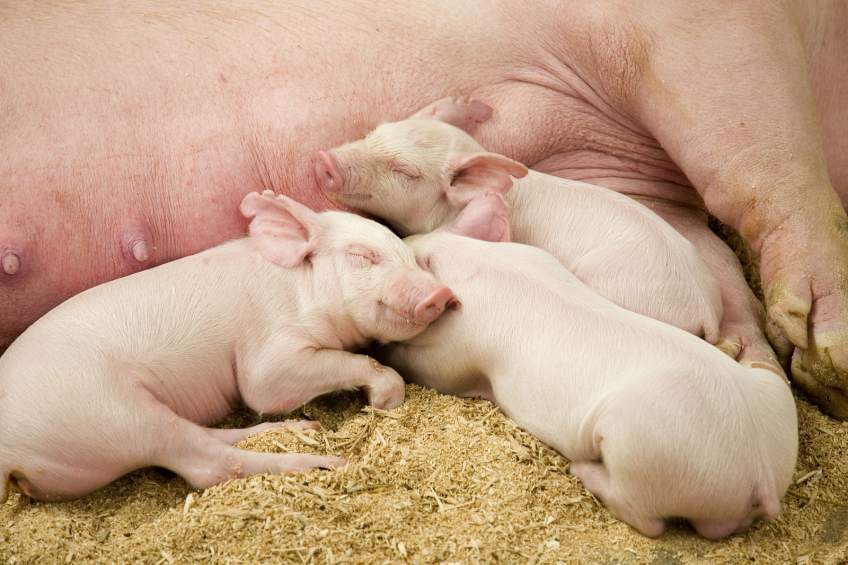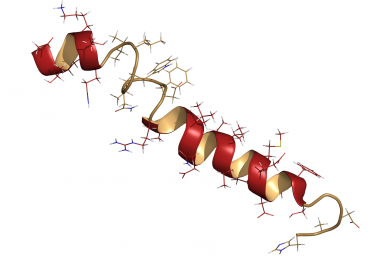Balancing the microbiota benefits the entire pig herd

Sow nutrition is a key element for breeding performance, and thus for the financial success of pig farming. Therefore, short-chain fructo-oligosaccharide supplementation in sows has a pivotal role to play in establishing a balanced microbiota in both sows and piglets.
The perinatal period is a critical period in which the intestinal microbiota establishes itself, and the gut and immune systems develop. This period is of great importance in pigs as their immune systems are very immature at birth. In this context, during lactation and the starting phase, nutrition plays a key role in the proper development of piglets to eventually maximise their health and growth performance.
Short-chain fructo-oligosaccharides (scFOSs) are prebiotic soluble fibres obtained from sugar thanks to bioconversion leading to the formation of GF2, GF3, and GF4 (G for Glucose and F for Fructose). scFOSs, including the Tereos product Profeed, modulate the intestinal microbiota by enriching it, making it more stable and more resilient. scFOS prebiotic activity has been demonstrated in various animals and is well established in pigs where it boosts bifidobacteria and lactobacilli activity and growth, increases faecal volatile fatty acid concentration, whilst strengthening the integrity of the intestinal barrier.
Recent results were obtained on the effects of scFOSs on sow health, as well as piglet performance and health in a research programme led by Tereos. The project, concluding at the end of 2016, consists of the PhD course of Cindy Le Bourgot in collaboration with the INRA Institute (French National Institute for Agriculture Research), Saint-Gilles, France and an additional trial on a pig farm.
In the first trial, conducted at the INRA Institute, 15 sows were given a control diet (commercial feed for breeding sows) and 15 other sows were given an addition of 10 g scFOSs/day during the last four weeks of gestation and lactation. The second trial was conducted in a commercial breeding facility in the South West of France with 130 sows. The experimental design was similar, but the supplementation was only started 5-7 days before farrowing.
Modification of the physiological status
In both trials, at the end of lactation, sow back fat tended to be thicker in the supplemented animals (P<0.10;>Figure 1). The end of gestation and lactation are periods during which sows may become insulin-resistant. scFOSs may have had an effect on the regulation of insulin in sows like what was already shown in insulin-resistant animals. Furthermore, in the trial conducted in the breeding facility, the sows were ‘quieter’ at farrowing and the duration of farrowing was significantly reduced. Finally, in the trial conducted in the breeding facility, scFOS supplementation had a positive impact on sow prolificacy during the reproductive cycle following the supplementation period (14.9±0.29 versus 16.2±0.29 piglets were born with the control diet and the scFOS supplemented diet, respectively; P = 0.06).
Figure 1 – Fat back thickness change in sows supplemented or not with scFOSs (values ± standard error). On the left: INRA trial; on the right: trial in a breeding facility.

The trial conducted in the INRA Institute showed a strong increase in the concentration of immunoglobulins A (IgAs) in colostrum thanks to scFOSs stimulating cells producing IgAs. The concentration of the cytokine, transforming growth factor beta-1, was also increased in colostrum. This cytokine stimulates immune cell maturation and development in the piglet digestive tract.
The in vitro tests demonstrate that the cells from the intestine of 21-day old piglets whose mothers had received scFOSs secrete more IgAs, which are proteins involved in the protection against potentially pathogenic bacteria in the gut. At the same time, secretion of interferon-gamma is higher. At this early stage, stimulated secretion of interferon-gamma is a positive indicator of piglet immune system maturation. These results suggest that supplementing sows with scFOSs during gestation and lactation, allows improvement in piglet gut maturation, probably due to modulation of the immune quality of the colostrum and to early microbiota colonisation at birth.
Response to immune challenges
In those trials, the sow litters were divided into two in order to test the specific immune response following influenza vaccination. A piglet group received a control diet, and the other group received the same diet supplemented with 1.2 g scFOSs/day for 21 days (trial in the breeding facility) and 50 days (INRA trial). In both trials, supplementing the sows had no effect on the immune response to influenza infection, contrary to supplementing the piglets. In the trial conducted in the INRA Institute, an increase in plasma (P<0.10) and faecal (p><0.05) concentrations of specific igas was noted in the piglets that had been supplemented with scfoss. a significant correlation between specific igas and iggs in plasma was also noted. in the trial conducted in the breeding facility, the plasma concentration of specific iggs was increased by scfos supplementation (p=”0.05).” to confirm the effect of scfoss on the immune response with another type of vaccination, a third trial was conducted at the saint-gilles inra institute, in which the piglets were vaccinated against>Lawsonia intracellularis at 34 days of age. The maternal supplementation significantly increased the plasma concentrations of specific anti-L. intracellularis IgAs and IgGs. The full data set suggests that supplementing piglets or sows with scFOSs has an impact on the specific immune responses when piglets are exposed to immune challenges, modelled by vaccinations in this context.
Long-term growth performance
The animals that were given scFOSs at the beginning, and whose mothers were also given scFOSs, reached their slaughter weights more quickly than the others (P<0.05;>Table 1). Similarly, in the trial, Le Bourgot noted a delay effect on the live weight of piglets whose mothers had been given the scFOS-supplemented diet. In addition to the increased growth rate, supplementing piglets with scFOSs after weaning tended to reduce subcutaneous fat thickness (G2; P < 0.10). This data shows giving scFOSs to sows until weaning and to piglets in starting phase stimulates growth performance until slaughter.

This research programme demonstrates supplementing sows with scFOSs improves the physiological status, the immune quality of colostrum, and the early maturation of the intestinal immune system in suckling piglets. Early supplementing of piglets with scFOSs ‘boosts’ the immune response to a challenge while increasing growth performance. Ultimately, thanks to supplementing sows and piglets with scFOSs, the breeders can earn more income. On the basis of current knowledge, it can be recommended to supplement 0.15% scFOSs in lactating sows and starting piglets, and supplement 0.30% scFOSs in gestating sows (1 to 4 weeks before farrowing). Based on these results, Tereos created a record providing the scientific support necessary to claims related to the stimulating effect of scFOSs on the immune response in case of challenge, in accordance with the European regulation 767/2009.
References available upon request.









